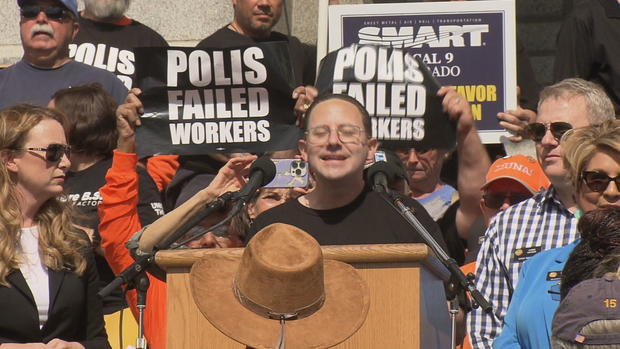Construction workers protest after Gov. Jared Polis vetoes wage theft bill
According to the Colorado Fiscal Institute, nearly $730 million in wages are stolen from Colorado workers every year. Workers, labor advocates, and legislators rallied at the state Capitol after Gov. Jared Polis vetoed a bill aimed at protecting construction workers from wage theft.
Construction workers make up seven percent of the state's workforce, and account for 17% of all wage theft claims.
House Bill 24-1009 aimed to protect construction workers from theft by expanding general contractor liability for wage claims involving subcontractors.
It also required that a subcontractor that receives a written demand for payment forward a copy of the written demand for payment to the general contractor within three business days after receipt.
Many industry workers at the rally, like Caylen Terry, say they've experienced wage theft in their careers.
"My past employer, before joining the union, had me doing all kinds of projects and underpaid me," said Terry, a millworker. "They're living easy lives while we're struggling paycheck to paycheck sometimes."
Jordan Jones, a representative for the Western States Regional Council of Carpenters, says the legislature passed HB1008 with strong majorities because it recognized that victims of wage theft need more protections and better ways to get the wages they earned.
Several lawmakers joined workers at the rally to express their disappointment with the veto.
"Wage theft happens every single day at job sites across Colorado," said Jonathan Morales, an impacted worker. "I've been a victim of wage theft and I know many, many others who have been. Gov. Polis failed us with his vetoes. But there is a way to make it right and we hope he'll finally meet with us and work with us in a meaningful way so all Colorado workers have the protections they deserve."
Polis says the bill goes too far in holding general contractors accountable.
In a letter to state house representatives, Polis writes:
"General contractors should of course seek to use contractors with a history of following the law and paying all for their employees. But crafting a unique and novel joint liability mechanism for wage claims in this sector only – including in situations where the general contractor has no relationship with the responsible employer – would not punish the real wrongdoers."
He says the bill would let subcontracts who fail to pay their workers off the hook and do little to prevent additional wage theft.
Polis says he remains open to a more effective approach to the issue of joint liability in the industry. He has directed the Department of Labor and Employment to work with stakeholders on all sides to further explore proposals.










